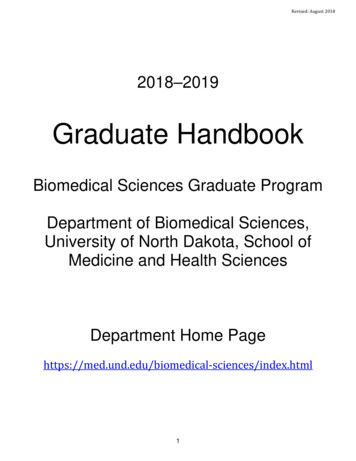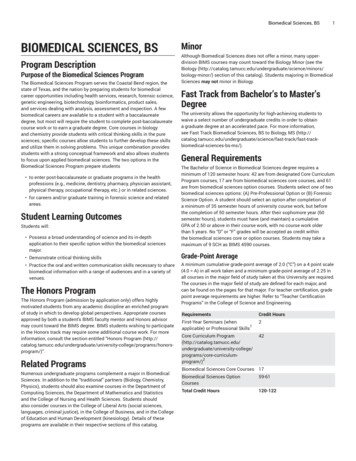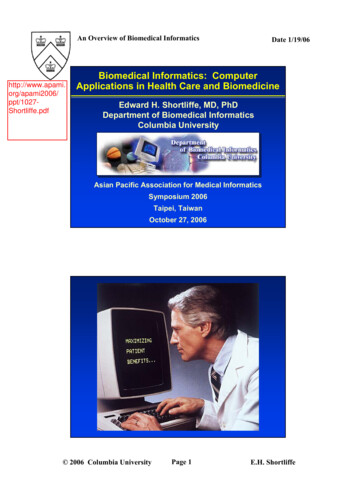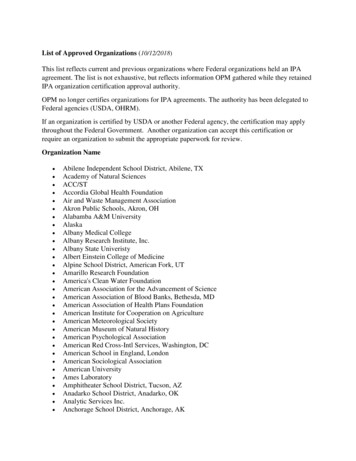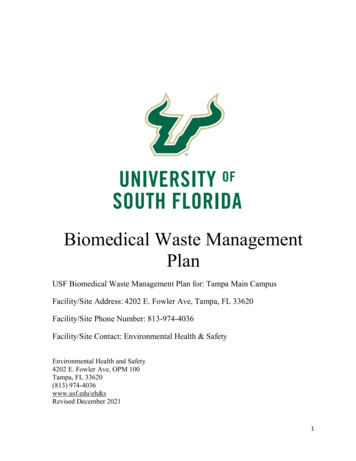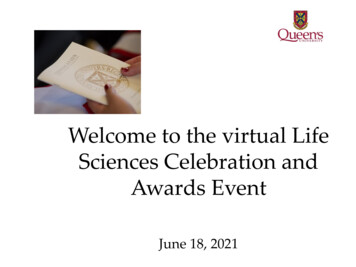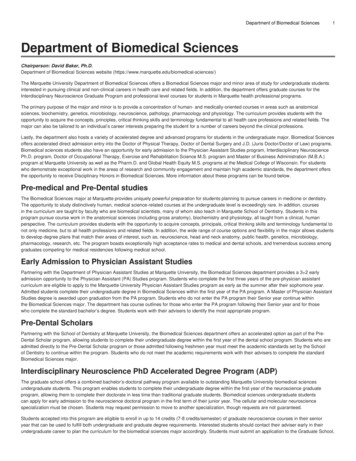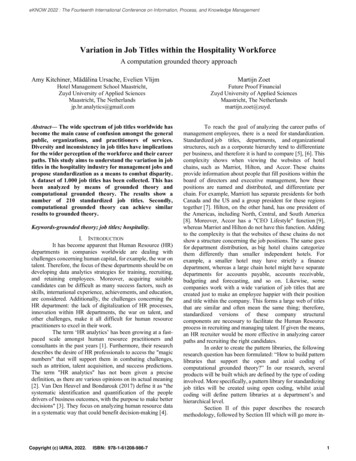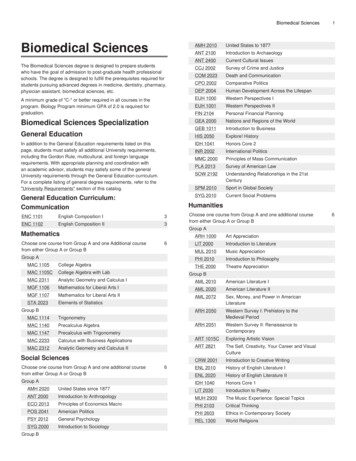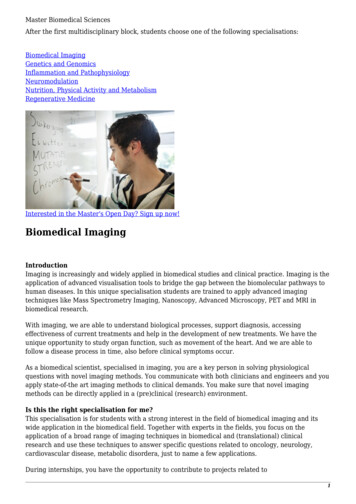
Transcription
Master Biomedical SciencesAfter the first multidisciplinary block, students choose one of the following specialisations:Biomedical ImagingGenetics and GenomicsInflammation and PathophysiologyNeuromodulationNutrition, Physical Activity and MetabolismRegenerative MedicineInterested in the Master's Open Day? Sign up now!Biomedical ImagingIntroductionImaging is increasingly and widely applied in biomedical studies and clinical practice. Imaging is theapplication of advanced visualisation tools to bridge the gap between the biomolecular pathways tohuman diseases. In this unique specialisation students are trained to apply advanced imagingtechniques like Mass Spectrometry Imaging, Nanoscopy, Advanced Microscopy, PET and MRI inbiomedical research.With imaging, we are able to understand biological processes, support diagnosis, accessingeffectiveness of current treatments and help in the development of new treatments. We have theunique opportunity to study organ function, such as movement of the heart. And we are able tofollow a disease process in time, also before clinical symptoms occur.As a biomedical scientist, specialised in imaging, you are a key person in solving physiologicalquestions with novel imaging methods. You communicate with both clinicians and engineers and youapply state-of-the art imaging methods to clinical demands. You make sure that novel imagingmethods can be directly applied in a (pre)clinical (research) environment.Is this the right specialisation for me?This specialisation is for students with a strong interest in the field of biomedical imaging and itswide application in the biomedical field. Together with experts in the fields, you focus on theapplication of a broad range of imaging techniques in biomedical and (translational) clinicalresearch and use these techniques to answer specific questions related to oncology, neurology,cardiovascular disease, metabolic disordera, just to name a few applications.During internships, you have the opportunity to contribute to projects related to1
Master Biomedical Sciencescancer, neurodegenerative, cardiovascular and metabolic diseases. The excellence of imaginginfrastructure and expertise at Maastricht UMC is recognised worldwide.What will I learn?Within this specialisation, you learn how to apply novel technologies to biomedical sciences to solvea biomedical research question. You also learn the basic principles of the imaging modalities, so youcan make correct choices of imaging methods for specific questions. The focus is really on thebiomedical problem and not so much on the underlying methodology/technology.The courses within the specialisation offer interactive teaching to learn from expert researchers,hands-on experiments through practicals, lab visits, workshops, projects, interaction with clinicians,and internships in our research laboratories.What are my career prospects?The world needs highly skilled scientists to apply imaging to scientific research, and within theclinic. This specialisation prepares you for a career at a university, in different research institutesaffiliated with academic organisations, companies (biomedical and pharmaceutical companies;medical devices) and university hospitals.ProgrammeCourse 1: Pre-clinical ImagingThis first course is focused on pre-clinical imaging, which ranges from ex vivo imaging of a singlemolecule to in vivo imaging of animal models. The course aims to give you insight into the basicprinciples as well as the biomedical applications of ex vivo and noninvasive in vivo imagingtechniques. Imaging techniques that will be discussed are mass spectrometry imaging (MSI),electron and light microscopy (EM and LM), ultrasonography, Magnetic Resonance Imaging (MRI),Computed Tomography (CT), and nuclear imaging (Single Photon Emission Computed Tomography(PECT) and Positron Emission Tomography (PET).You learn to prepare samples, acquire, transform, analyse and utilise various imaging modalities tovisualise sub-cellular structures up to whole animal imaging. Combined, these preclinical researchmethods pave the way for new diagnostic approaches required for personalised and systemsmedicine.Within this course you will design a project to learn how to solve a biomedical research questionwith advanced imaging. The distinctive (molecular) imaging infrastructure at the Maastricht UMC is available for students, who will have the opportunity to meet and interact with experts in theimaging field.Course 2: Clinical ImagingThis second course in this specialisation focuses on the application of imaging to addressphysiological and pathological disease processes in man in a clinical (research) setting. Imagingtechnologies provide increasingly accurate detail on morphology, structure, function and dynamicsof living systems. In life sciences and (translational) clinical research, the use of (diagnostic) imagingtechnologies has become increasingly widespread and has now also entered the area of preventionand therapy monitoring.This course focuses on imaging in treatment decisions based on molecular clinical diagnosticinformation and patient images. Clinical imaging focuses on in vivo imaging, image-guidedinterventions/biopsies and molecular tissue pathology and morphology. This course addressestranslational aspects from systems biology to in vivo imaging of the patient with MRI/MRS and otherradiological methods.2
Master Biomedical SciencesYou will be introduced to the concept of radiomics in which imaging features are extracted frommedical images. Intraoperative diagnostics and image-guided surgery are studied as innovativeapproaches that put molecular analytical information in the hands of medical practitioners. Thiscourse teaches biomedical scientists to be the interface between imaging technology and the clinic.Moreover, this course provides a translational / clinical environment to teach students to work sideby-side with clinicians on innovations in systems medicine.More informationFor more information on admission, please contact our master admission office.Ask a studentMandana chose the specialisation Biomedical Imaging. She posts weekly about her experiences onInstagram.She is also happy to answer your questions about the master's programme in Biomedical Sciences,her specialisation and (student) life in Maastricht through DM on Instagram.This video gives you an impression of the specialisation Biomedical Imaging. It is a show and tell bythree people who are in one way or another involved in this specialisation: dr Tiffany Porta Siegel,student Rob Janssen and senior principal scientist at Janssen Pharma Rob Vreeken.Master BMS, specialisation Imaging from Molecule to ManGenetics and GenomicsIntroductionGenetics and genomics both play roles in health and disease. Genetics helps us understand howdiseases are inherited, what screening and testing options or treatments are available. Genomicshelps us to discover why some people get sick from certain infections, environmental factors, andbehaviours, while others do not.Is this the right specialisation for me?This specialisation is developed in order to provide students with a strong foundation and expertisein the field of genetics. Main focus is on the application of genetics and genomics principles inscientific research and in the clinic with specific attention for cancer, cardiogenetics, neurogenetics,model systems, forensics and personalised medicine.What will I learn?You will:obtain knowledge about technologies for high-throughput collection of 'omics' data and aboutmodels used for genetic manipulation or complex human disorders;learn about the concepts and limitations of genetic testing, genetics diversity and the influence ofepigenetics on the fundamental regulation of gene expression;analyse data and define ethical and societal issues concerning genetics and genomics;apply the concepts of molecular genetics in the context of research and treatment of diseases3
Master Biomedical Sciences(cancer progression, cardiogenetics and neurogenetics);identify genetic and biological pathways in complex diseases; andapply genetics and genomics in personal medicine.What are my career prospects?This specialisation prepares you for a research-oriented future in the field of genetics and genomicsin academia, biomedical companies and in the clinic.ProgrammeIn the first course, the basic principles of genetics and genomics will be taught. This course servesas the basis for work in the second course, which focuses on translation and application of theknowledge obtained in the first course to solve challenging clinical problems.Course 1: Advanced Principles of Genetics and GenomicsIn this course, the molecular mechanisms of genetic and environmental influences on geneexpression and protein function are being addressed. Additionally, the principles of severalalgorithms and the databases and analytical programmes available in the public domain are beingaddressed. Finally, the impact of genetics and genomics on research and society with respect topersonalised medicine and ethical issues will be discussed.Course 2: Clinical and Applied Genetics and GenomicsThis course further elaborates on the application of genetics and genomics principles in scientificresearch and clinical applications with specific attention for cancer, cardiogenetics, neurogenetics,model systems, forensics and personalised medicine.More informationFor more information on admission, please contact our master admission office.Ask a studentDaniel chose the specialisation Genetics and Genomics. He posts weekly about his experiences onInstagram.He is also happy to answer your questions about the master's programme in Biomedical Sciences,his specialisation and (student) life in Maastricht through DM on Instagram.This video gives you an impression of the specialisation Genetics and Genomics. It is a show and tellby three people who are in one way or another involved in this specialisation: prof.dr Ronit ShiriSverdlov, student Jasper Germeraad and laboratory specialist in clinical Genetics at MUMC drBianca van den Bosch.Master BMS, specialisation Genetics and GenomicsInflammation and PathophysiologyIntroduction4
Master Biomedical SciencesOur aging society is facing many threats, including oncologic, neurologic and cardiovascularproblems. Frequently, these problems are of inflammatory nature or are caused by infections.Therefore, this specialisation aims to develop a thorough, clinically relevant understanding ofdifferent mechanisms of development of disease. The specialisation also describes current relevantanimal models.Is this the right specialisation for me?We aim to prepare you to contribute to the understanding of inflammation and pathological threads,and develop new treatment strategies. The development includes engineering of the immune systemto develop cell therapies, antibody therapy, vaccination, drug development and gene therapy.This is the specialisation for you:if you are interested in manipulation of the immune system, andif you wish to pursue a career either in industry (biotechnology) or academia.What will I learn?You will:learn pathophysiology of relevant organs,learn techniques for the study of molecules, cells and organisms,obtain clinically relevant understanding of different mechanisms of disease,learn to target immunological threads,create new therapeutic strategies targeting the immune system,get prepared for working in academy and industry,read and think in a critical way,design, conduct, analyse, explain and defend your research (via research papers, essays,presentations), andcollaborate in small teams.Goals of this specialisation are:to understand path·o·phys·i·ol·o·gy:the study of structural and functional changes in tissue and organs that lead to disease;to evaluate different types of therapies, vaccination and immune system effector functions;to engineer the immune system, treatment of disease.What are my career prospects?This specialisation prepares you for a research career in the field of inflammation andpathophysiology in academia, hospitals, and industry (biomedical companies) et cetera (e.g. PhD,embedded scientists, R&D).Programme This specialisation combines an education in concepts with a sophisticated training in immunologicaltechniques.Course 1: Inflammation and Pathophysiologylearn sterile inflammation and other pathological threats leading to degenerationexplain hypersensitivity disordersexplain immunity to tumorsappraise immunity to microbesCourse 2: Inflammation and Pathophysiology - Engineering the Immune System, Treatment ofDiseaseexplain and design antibody engineering5
Master Biomedical Sciencesexplain and design cell therapyevaluate and design vaccinationdiscuss organ transplantationappraise gene-therapy techniquesassess the potential of microbiome targetingMore informationFor more information on admission, please contact our master admission office.Ask a studentSofia chose the specialisation Inflammation and Pathophysiology. She posts weekly abouther experiences on Instagram.She is also happy to answer your questions about the master's programme in Biomedical Sciences,her specialisation and (student) life in Maastricht through DM on Instagram.This video gives you an impression of the specialisation Inflammation and Pathophysiology. It is ashow and tell by three people who are in one way or another involved in this specialisation: prof.drPilar Martinez, student Jan Gaede and dr. René Hoet (VP Biologics Research at Bayer AG andprofessor in Biopharmaceutics at UM).Master BMS, specialisation Inflammation science has provided invaluable insights into the organisation of the central nervous system.Building on decades of fundamental and clinical research, neuromodulation has recently emerged asa very promising field that has the potential to change the neuroscience landscape. Equipped withdetailed knowledge of neuroanatomy and neurophysiology, a wide spectrum of invasive and noninvasive techniques has been developed that allows manipulation of the central nervous system fromthe micro to the macro level. This offers unprecedented opportunities for scientific research andopens the door for novel clinical applications in various diseases/disorders of the central nervoussystem. To illustrate, deep brain stimulation can target specific nuclei in the brain stem to instantlyreduce tremor in Parkinson’s disease. Transcranial magnetic stimulation has proven efficacy in drugresistant depression with virtually no side effects. Spinal cord stimulation can alleviate chronic painsymptoms. These and many more examples will be illuminated in this specialisation inneuromodulation.Maastricht University has a strong tradition in neuromodulation research and application, across awide spectrum of neuromodulation techniques. Embedded in this unique neuromodulation network,we offer this one of a kind specialisation as part of the master's in Biomedical Sciences. Thisspecialisation is interdisciplinary in content and inter-departmental in structure, designed to offercutting-edge theoretical and methodological training. Students will be able to choose between6
Master Biomedical Sciencesinternships in research laboratories, and/or clinical placements, and/or industrial settings. Studentswill be prepared to unravel the mechanisms of the human brain and to unleash the full therapeuticpotential of neuromodulation in various clinical fields.Is this the right specialisation for me?This specialisation is developed for students who are enthusiastic about the potential ofneuromodulation in scientific research. We hope to attract curious and creative minds that are eagerto learn the principles of neuromodulation, get inspired by current clinical applications, and thenproceed to contribute to this highly interdisciplinary field.What will I learn?You will:have essential knowledge about neuroanatomy and neurophysiology to understand the basicprinciples of current neuromodulation techniques,have a comprehensive overview of state-of-the-art neuromodulation approaches and their currentclinical applications,understand how insights into the pathophysiology of the central nervous system can be translatedinto clinical applications of neuromodulation in neurology and psychiatry, andbe aware of current trends, developments, limitations, and future challenges in the field ofneuromodulation.What are my career prospects?The field of neuromodulation is increasingly relevant in scientific research, clinical settings, andindustry. There is a high demand for skilled experts who can further develop existing methodology,explore novel applications, and promote the implementation of neuromodulation approaches inclinical practice. This specialisation prepares you for a future in the field of neuromodulation at anacademic organisation, clinical institution or biomedical company(e.g. PhD candidate, embeddedscientists, R&D).ProgrammeThis specialisation offers a comprehensive overview of the fundamental principles and applicationsof current neuromodulation techniques.Course 1: Fundamental NeuromodulationThe first course starts by providing essential knowledge about neuroanatomy and neurophysiologyrequired to understand the basic principles of current neuromodulation techniques. Building on thisfoundation, various state-of-the-art neuromodulation approaches will be explored in detail, with aparticular focus on deep brain stimulation, spinal and sacral neuromodulation, and transcranialmagnetic stimulation. Next to conventional neuromodulation techniques, the participants will beintroduced to novel neuromodulation techniques including optogenetic, chemogenetic and wirelessneuromodulation. At the end of this course, students will have a proper understanding of currentneuromodulation techniques and they will be aware of recent trends and developments in the field.Course 2: Translational NeuromodulationThe second course showcases how insights into the pathophysiology of the central nervous systemcan be translated into clinical applications of neuromodulation in neurology and psychiatry. Variousnovel treatment approaches using neuromodulation have emerged over the last few years and areincreasingly used world-wide. Prominent examples include the application of deep brain stimulationin Parkinson’s disease, and the treatment of depression using transcranial magnetic stimulation.These and many other examples will be discussed, revealing the potential of neuromodulation inclinical practice.7
Master Biomedical SciencesMore informationFor more information on admission, please contact our master admission office.Ask a studentTara chose the specialisation Neuromodulation. She posts weekly about her experiences onInstagram.She is also happy to answer your questions about the master's programme in Biomedical Sciences,her specialisation and (student) life in Maastricht through DM on Instagram.This video gives you an impression of the specialisation Neuromodulation. It is a show and tell bythree people who are in one way or another involved in this specialisation: researcher Alix Thomson,prof.dr Alexander Sack and prof.dr. Yasin Temel.MSc Biomedical Sciences: specialisation NeuromodulationNutrition, Physical Activity and MetabolismIntroductionA lifestyle characterised by overnutrition of macronutrients and underconsumption ofmicronutrients, along with physical inactivity translates into derailments in metabolic health andultimately into deteriorated function and health. A wide range of currently prevalent disorders inwesternised societies find common ground in metabolism that goes awry.The aim of this specialisation is to understand the physiology and the mechanisms underlying thesederailments to provide the basis for the ultimate design and optimisation of preventive andtherapeutic nutritional and life-style interventions that improve metabolic health and alleviate thediseased state.Is this the right specialisation for me?If you have a genuine interest in how diet, physical activity and a sedentary lifestyle affect health If you are interested in the mechanisms (from molecule to man) governing the (mal)adaptiveresponses of the human body to changes in energy availability and demand If you would like to know the state-of-the-art on how exercise and physical activity interventions canpromote health If you are eager to gain the knowledge needed to design novel life-style interventions to promotehealth Than this is the specialisation of your choice!What will I learn?In this specialisation you will study deeply into:the integrative and interorgan physiology of key metabolic processes;the biochemical and cellular basis for diet- and exercise-induced alterations in health;the biochemical and cellular basis for the health threatening effects of a sedentary life-style;8
Master Biomedical Scienceshow nutrition and physical activity affect non-communicable diseases;identification of routes fundamental to the design of non-exercise related life-style interventions topromote energy turnover and health.What are my career prospects?To halt the progressive increase in prevalence of disorders that find common ground in disturbedmetabolism, we need highly skilled people to identify potentially successful targets and routes forintervention via scientific research. This includes research in academia, hospitals and industry(ranging from biomedical and pharmaceutical companies to companies developing wearables tomonitor health and physical activity). You can also apply the knowledge acquired in (academic)teaching or in public health settings to provide new scientific background to novel health promotionprogrammes.ProgrammeCourse 1: Nutrition, Physical Activity and Metabolism: Fundamental AspectsThis course will provide in-depth insight into the major systems of human nutritional and exercisephysiology and metabolism. With basic knowledge on nutrient uptake across the gastrointestinaltract as the starting point, the course will focus on cell and organ specific routes for conversion ofmacromolecules into their oxidizable derivatives. Importantly, the pivotal role of intermediarymetabolism, metabolites and small circulatory hormones like peptides in metabolic control and interorgan cross-talk (muscle-liver-adipose tissue-cardiovascular system-brain) will be thoroughly studiedin the fasted, post-prandial and exercised state. This course will provide the mechanistic basis tounderstand how aberrations in energy and substrate metabolism can be the common denominator inmultiple highly prevalent disorders like Alzheimer’s disease, Parkinson, some types of cancer ormetastases, COPD, sarcopenia, obesity, type 2 diabetes and related cardiovascular disorders.Alterations in energy status, energy sensing and energy turnover have all been associated with thesedisorders. These alterations may originate from compromised nuclear receptor signaling, posttranscriptional modulation via e.g. micro RNA’s, post-translational modification (acetylation,glycosylation, phosphorylation) hampering protein function and metabolic processes alteringNAD /NADH and ADP/ATP related energy status of the affected cells. With mitochondria being thesubcellular hub in energy turnover, detailed knowledge on the dynamics of the mitochondrialnetwork is considered an essential part of this course.Course 2: Lifestyle Interventions and Metabolism; a Translational PerspectiveIn this course the role of diet and physical activity to prevent chronic disease in humans will beconsidered. Lifestyle factors modulating metabolism on a micro (cellular) and macro (organ) scalewill be studied via a translational approach. This course will take conventional strategies to promotehealth (like nutritional and exercise interventions) to the next level by exploring the underlyingmechanisms and how these interventions may prevent chronic diseases like cardiovascular disease,cancer, chronic respiratory diseases and diabetes. Interventions like weight loss, (nutritional)compounds, exercise, sedentary behaviour, sleep, stress management promoting metabolism will betopic of study. The basis for inter-individual differences in responsiveness, including genetics, will bestudied in the light of personalised interventions to promote health and prevent disease.More informationFor more information on admission, please contact our master admission office.Ask a studentJana chose the specialisation Nutrition, Physical Activity and Metabolism. She posts weekly abouther experiences on Instagram.9
Master Biomedical SciencesShe is also happy to answer your questions about the master's programme in Biomedical Sciences,her specialisation and (student) life in Maastricht through DM on Instagram.This video gives you an impression of the specialisation Nutrition, Physical Activity and Metabolism.It is a show and tell by three people who are in one way or another involved in this specialisation:prof.dr Matthijs Hesselink, student Marvin Feldmann and nutrition and movement sciencesresearcher at UM Marlies de Ligt.Master BMS, specialisation Nutrition, Physical Activity andMetabolismRegenerative MedicineIntroductionAn increasingly ageing population in the industrialised world is accompanied by a number of newchallenges. For example, as ageing is combined with a more active lifestyle, the demand fortreatments for damaged and diseased organs and tissues also increases.The interventions that are used to successfully restore the function of damaged organs or tissueshave also changed in the past decades. While some thirty years ago implants were used to passivelytake over the function of a poorly functioning tissue, nowadays the focus is on developing methodsthat temporary 'trigger' the body to repair or regenerate itself. Furthermore, such interventionsneed to be affordable, as the burden to our healthcare system is also growing.To be able to develop successful and affordable regenerative strategies, knowledge must beintegrated from different disciplines. An active collaboration between chemists, materials scientists,physicists, biologists, computational scientists and clinicians is required to make a true difference inthe biomedical field.Is this the specialisation for me?This specialisation is developed for students with an interest in a multidisciplinary field aiming atcreating solutions to restore structure and function of permanently damaged tissues and organs byusing a combination of science and technology. Regenerative medicine (RM) is inherentlytranslational and uses basic scientific knowledge to solve real clinical problems. Within thisspecialisation, topics will focus on both the molecular biological (including stem cell biology andgene therapies) and technological (including tissue engineering and bio-fabrication technologies)aspects, and the combination thereof within a clinical context.What will I learn?You will:obtain an overview of the science and technology in the field of RM;be exposed to the essence of multi-disciplinarity within RM;understand the difference between basic science and translational science;learn how to bring novel inventions within the field of RM to the market;make the scientific journey from basic science and technology towards a clinical application; andlearn to communicate specialised knowledge to a group of scientists with different background andspecialisations.10
Master Biomedical SciencesWhat are my career prospects?This specialisation prepares you for a research-oriented future in the field of regenerative medicinein academia, biomedical companies, et cetera (e.g. PhD, embedded scientists, R&D).ProgrammeIn the first course the basic principles of RM are taught. This course serves as the basis for work inthe second course, which focuses on translation and application of the knowledge obtained in course1 to solve challenging clinical problems.Course 1: The Science and Technology of Regenerative TherapeuticsThis course is about exposure to the essence of multi-disciplinarity of RM. You will increase yourlevel of knowledge on the technology and science behind regenerative medicine such as cell therapy,material science, fabrication technologies and combinations of these, within a clinical context.Course 2: Translating Therapies into the Clinic and onto the MarketIn this course, we will make the scientific journey from science and technology to the clinic andproducts. Using actual clinical challenges, you have to work out a new solution to that clinicalproblem supported by experts in the field. You will know where to put biomedical solutions in theTechnology Readiness Level chain and you will learn how to take it a step further and learn tocommunicate specialised knowledge to a group of scientists from different disciplines.More informationFor more information on admission, please contact our master admission office.Ask a studentSimone chose the specialisation Regenerative Medicine. She posts weekly about her experiences onInstagram.She is also happy to answer your questions about the master's programme in Biomedical Sciences,her specialisation and (student) life in Maastricht through DM on Instagram.This video gives you an impression of the specialisation Regenerative Medicine. It is a show and tellby three people who are in one way or another involved in this specialisation: prof.dr Jan de Boer,student Daphne Eussen and entrepreneur Niloofar Tahmasebi.Master BMS, specialisation Regenerative MedicineAdditional specialisationsHasselt University (Belgium)Hasselt University offers two additional specialisations:Bio-electronics and Nanotechnology, which focuses on biomaterials, the interface betweenbiological and electronic systems, and the broad domain of biosensors.Environmental Health Sciences, which focuses on the molecular interaction between theenvironment and cells, toxicology, and risk assessment.11
Master Biomedical SciencesLearn more about these speci
Mandana chose the specialisation Biomedical Imaging. She posts weekly about her experiences on Instagram. She is also happy to answer your questions about the master's programme in Biomedical Sciences, her specialisation and (student) life in Maastricht through DM on Instagram. This video gives you an impression of the specialisation Biomedical .

